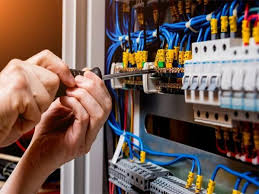All Type Of Electrical Works in House, Office , Building, Cafe, Restaurant in Indore call: 7000453295


Installation: Electricians install electrical systems in new construction projects, including wiring, outlets, switches, circuit breakers, and lighting fixtures. They follow building codes and blueprints to ensure that the electrical system is safe and functional.
Maintenance: Electricians inspect and maintain existing electrical systems to ensure they are operating efficiently and safely. This involves checking for signs of wear and tear, replacing damaged components, and performing routine maintenance tasks such as tightening connections and cleaning electrical equipment.
Repair: When electrical systems malfunction or fail, electricians diagnose the problem and make repairs to restore functionality. This could involve troubleshooting issues with wiring, circuit breakers, outlets, or other electrical components.
Upgrades: Electricians may upgrade electrical systems to accommodate new technology or increased electrical demand. This could involve installing additional outlets, upgrading circuit breakers, or rewiring sections of the building.
Consultation and Planning: Electricians meet with shop owners or managers to discuss their electrical needs and requirements. They assess the layout of the shop, the type of equipment and lighting needed, and any specific electrical considerations based on the nature of the business.
Specialization: Some electricians specialize in specific areas such as residential, commercial, or industrial electrical work. They may also specialize in areas like solar power installation, HVAC electrical systems, or data cabling.
Designing Electrical Systems: Based on the consultation, electricians design electrical systems tailored to the shop's requirements. This includes planning the placement of outlets, switches, lighting fixtures, and any specialized equipment such as refrigeration units, display lighting, or machinery.
Wiring and Installation: Electricians install the wiring and electrical components according to the design plan. This involves running wires through walls, ceilings, and floors, installing outlets, switches, and circuit breakers, and connecting lighting fixtures and appliances.
Lighting Installation: Electricians design and install lighting systems to illuminate the shop effectively. This includes overhead lighting, task lighting for work areas or display cases, accent lighting to highlight products, and emergency lighting for safety.
Power Distribution: Electricians ensure that the shop has adequate power distribution to support its electrical needs. This involves sizing and installing circuit breakers, panels, and transformers to safely distribute electricity throughout the premises.
Security and Safety Systems: Electricians may install security and safety systems such as CCTV cameras, alarm systems, smoke detectors, and emergency exit lighting to enhance security and comply with safety regulations.
Equipment Installation and Wiring: In addition to general electrical work, electricians install and wire specific equipment used in shops, such as cash registers, refrigeration units, display cases, and POS systems.
Testing and Inspection: Once the electrical work is completed, electricians test the system to ensure everything is functioning properly and safely. They may perform voltage tests, continuity tests, and insulation resistance tests to verify the integrity of the electrical installation.
Maintenance and Repairs: Electricians provide ongoing maintenance and repair services to keep the electrical system in good working condition. This includes troubleshooting electrical issues, replacing faulty components, and performing routine inspections to identify potential problems.
Code Compliance: Electricians ensure that all electrical work complies with local building codes, safety standards, and regulations. They obtain necessary permits for electrical installations and make sure that the shop's electrical system meets all legal requirements.
Safety: Ensuring safety is a critical aspect of an electrician's job. They must follow safety protocols and guidelines to prevent electrical accidents, fires, and other hazards. This includes using personal protective equipment, testing equipment before use, and following proper procedures for working with electricity.
Customer Service: Electricians often work directly with customers, discussing their electrical needs, providing estimates, and explaining the work that needs to be done. Good communication and customer service skills are important for building rapport and ensuring customer satisfaction.



